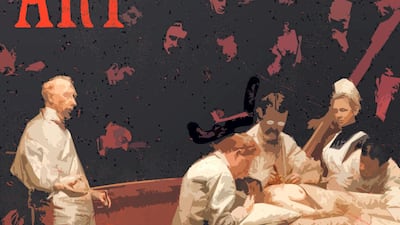In August 1865, a lucky young boy by the name of James Greenlees was abroad on the crowded streets of Glasgow. Enraptured by daydream, James stepped distractedly into the road before him – and directly into the path of a speeding cart. The vehicle threw him to the ground, crushed his left leg under one of its metal-rimmed wheels and left him lying in the street, screaming. His tibia, cracked by the force of the hurtling cart, was protruding from an aperture in his shin. His situation was critical.
Why, then, was he lucky? Because he was about to be transported to the premises of Joseph Lister, the only surgeon in Britain capable of treating his injuries without resorting to amputation – a brutal procedure that often resulted in death, and that would have, at best, robbed him of the ability to earn a living. Lister was determined that his patient should avoid these outcomes. And unlike the rest of the medical profession, Lister knew how to ensure he would do so.
That Lister possessed this knowledge was, as Lindsey Fitzharris shows in this hugely entertaining and informative account of his life and times, the product of irrepressible curiosity, independence of mind and dedication – qualities he had been developing since childhood. Born into a family of Quakers, Lister spent his formative years in an environment in which the sporting and recreational activities available to most children were forbidden. Instead, he devoted himself to science. Inspired by his father, who kept a museum of fossils at home and was an expert in designing microscopes, from an early age, Lister devoted himself to examining the skeletons of humans and animals. He shocked his parents by announcing his intention to become a surgeon – a lowly profession in the eyes of contemporaries.
Yet a surgeon he became. After enrolling at University College London in 1844 – and surviving a period of depression so acute that it almost caused him to abandon his career – Lister moved to Scotland to work with "the Napoleon of surgery", James Syme, whose daughter he married. He then secured posts at a number of institutions, including Glasgow Royal Infirmary and the University of Edinburgh. In these positions, he distinguished himself by extending to his patients an uncommon degree of kindness. When a young girl he had operated on handed him a doll whose leg had been pulled from its body, Lister took up a needle and thread to sew the limb back on. And when during the course of surgery, an assistant handed him two defective scalpels, Lister cast them into the fire and reprimanded his apprentice thus: "How dare you hand me a knife to use on this poor man that you would not like to have used on yourself?"
This commitment to the well-being and dignity of his patients was reflected in the diligence and doggedness Lister brought to his enquiries into the nature and prevention of post-operative infections. The prevailing wisdom and conduct of the age was built on the assumption that this kind of contagion was an inevitable and even beneficial part of surgery. Most practitioners made no effort to sterilise surgical instruments, occupied theatres that were thick with the bloody remnants of previous operations, and saw as an unalloyed good in the presence of pus and "good old hospital stink". Infections, it was held, occurred out of "miasma" or foul air. They could not be prevented.
Lister thought otherwise. His study of injured frogs yielded the observation that only when broken bones pierced a creature's skin was infection likely to ensue; and when he encountered Louis Pasteur's work documenting his discovery of the microscopic objects known as bacteria, it occurred to him that their effects might be neutralised. All he needed to do was find a way of killing them. From this point, Lister set about trying to find a substance suitable for the task, and hit on carbolic acid. This was the compound he applied to the maimed leg of James Greenlees in 1865. It cured him within six weeks.
During the next couple of years, Lister continued to refine his work. He recommended mixing carbolic acid with olive oil to reduce irritation of the patient's skin. He introduced the use of catgut ligatures that would dissolve in the body. He even argued for the sanitary benefits of the careful washing of hands. His findings, when he published them, were met with hostility and dismay by the medical profession. They saw his germ theory of disease as a myth; Lister as a liability. But he persevered, and gradually he and his ideas gained acceptance. In 1871, he was summoned to operate on an abscess "the size of an orange" lodged in the armpit of Queen Victoria. In 1897, she awarded him a knighthood.
The Lister that emerges from this book is a quiet, diffident, courteous man who hated quarrels and conflict, suffered from a stammer, but somehow found the bravery required to follow his unpopular convictions. Fitzharris brings his sensibility to life with great energy and elegance, and her account is vivid and entertaining, as well as enjoyably (and sometimes eye-wateringly) graphic. The result is rich with anecdote and intellectual excitement, replete with emotional resonance and narrative pleasure. Lister's work revolutionised modern medicine. The Butchering Art captures the spirit and science of his craft.
___________________
Read more:
Book review: Abandon is honest and emotional about the maternal battle
Book review: Tom Lee's The Alarming Palsy of James Orr, a sinister novella of great skill
Book review: Han Kang’s The White Book is a novel of extraordinary stylistic purity
___________________

